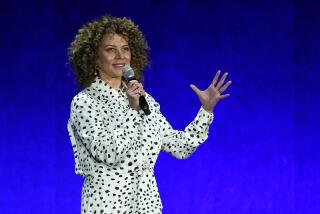HP Taps NCR Chief as Its CEO
SAN FRANCISCO — Hewlett-Packard Co. on Tuesday named NCR Corp. Chief Executive Mark Hurd to head the storied computer and printer maker as it struggles to compete in an industry it helped create.
Hurd, who joined NCR out of college in 1980, was a surprise choice. His hiring came seven weeks after HP’s board ousted chief Carly Fiorina over dissatisfaction with her “execution” after the acquisition of Compaq Computer Corp. that she engineered two years ago.
In many ways, the 48-year-old Hurd is what Fiorina wasn’t. She was flashy; he avoids the spotlight. She backed big ideas to boost sales; he is known as a strong day-to-day manager focused on margins.
“The key is that he’s an operations guy -- hands-on and a turnaround artist, and he’s solid,” said analyst Roger Kay of market researcher IDC. “He’s been at NCR for 25 years; he’s not in the quick-hit business. Carly always raised suspicions that she was just surfing through, but this guy is completely the opposite.”
The selection highlights the difficulties HP faces in running its core computer and printer businesses in the face of relentless competition from rivals such as Dell Inc. HP’s sales and profit have languished while Dell’s have climbed.
Investors hailed Hurd’s appointment. Shares of Palo Alto-based HP rose $1.99, or 10%, to $21.78 on the New York Stock Exchange. The rally boosted HP’s market capitalization by $5.8 billion -- nearly as much as NCR’s annual sales. Shares of Dayton, Ohio-based NCR fell $6.50, or 17%, to $31.40 on the NYSE.
Hurd, who will earn $1.4 million a year and pick up a $2-million signing bonus when he begins work Friday, declined to comment. He will meet with reporters this morning.
HP directors said they chose Hurd, in part, because of the structural similarities between HP and NCR, even though HP’s $80 billion in annual sales dwarfs NCR’s $6 billion. NCR makes automated teller machines for banks, cash registers and point-of-sale devices and sells to a variety of customers; HP makes consumer PCs, corporate servers and printers as well as cameras and televisions.
“Mark came to our attention because of his strong execution skills, his proven ability to lead top-performing teams and his track record in driving shareholder value,” HP Chairman Patricia Dunn said. “He demonstrated these skills by turning around NCR, which, while smaller than HP, is a complex organization with multiple business segments. As we got to know Mark, we were impressed by his emphasis on developing internal talent while reaching outside for new skills, his understanding of the role of culture in a company’s success and his personal integrity.”
Hurd’s hiring marks only the second time in HP’s 67-year history that an outsider has been chosen to run the company. The first was in 1999, with Fiorina’s selection.
IDC’s Kay said picking another outsider was “totally the right move.”
“Nobody inside the company could have taken that spot without their history coming into it,” Kay said. “They couldn’t come and do the clean broom act: take a look at all the businesses and see where do we want to take them.”
To that end, selecting Hurd also appears to bolster the board’s intention of keeping HP together. Some analysts and investors have called on the company to spin off its profitable printer business, but on Tuesday the board said it had no immediate plans to break up HP.
“Part of the search criteria was to endorse the strategy of the board,” said S.G. Cowan analyst Richard Chu. “NCR very is very far-flung, very international, with a global share. “It may be seen as a provincial Dayton, Ohio, company, but it has global reach, which is a big factor for HP.”
Hurd has enjoyed a strong record at NCR. Since he was promoted from chief operations officer to chief executive in 2003, NCR’s profit has quadrupled to $290 million last year, and its stock price has soared more than 300%.
One of Hurd’s strategies at NCR could prove particularly crucial at HP: boosting the “attach rate” of sales of server computers, which run large corporate and government computer networks. Fiorina had difficulty increasing sales of related products with its servers, while Hurd has shown an ability to cut multimillion-dollar consulting deals.
“HP has been wanting a higher attach rate where you sell a server, but also software, storage and services,” said Jean Bozman, a server analyst with IDC. “If you look at NCR they’ve had a solution-type sell, where when they sell a server they’re also making sure to sell a number of other components.”
Hurd earned a bachelor’s degree in 1979 from Baylor University. He joined NCR as a field salesman and worked in a variety of sales, management, operations and marketing roles. He had a successful run heading NCR’s data warehousing business, called Teradata, for three years, after which he was named president in 2001 and chief operating officer in 2002.
“Mark Hurd is the best CEO I know out there,” said Jeff Embersits, an analyst at Shareholder Value Management. “I think he’ll do a lot of good things at HP with a solid strategy and changing senior executives, clearing the deck.”
Other candidates were believed to include former Compaq chief Michael Capellas, who served briefly as president of HP after the merger; W. James McNerney Jr., chief executive of 3M Co.; and Richard Belluzzo, a former HP executive who is now chairman of Quantum Corp.





